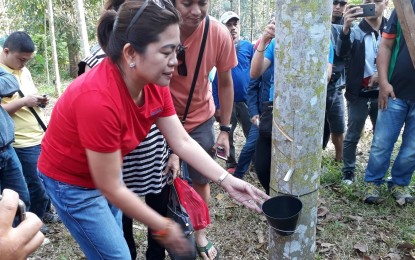
CEREMONIAL TAPPING. North Cotabato Governor Emmylou Taliño-Mendoza puts the cup on a rubber tree during the ceremonial rubber tapping at Myrna Gonzales Farm in Kisante, Makilala, North Cotabato on Saturday, Feb. 23, 2019. (PNA photo by Lilian C. Mellejor)

MAKILALA, North Cotabato -- A rubber farmer, who benefited from the Rubber Development Program of the North Cotabato provincial government, is bringing hope to more farmers to increase production using a new technology and good farming management at a lower cost.
The Myrna Gonzales Farm, which uses the "big bag" technology with budded rubber seedlings in its 1,800 rubber trees, conducted a harvest on Saturday — the second for the mother (Myrna) and her son, who both applied for the province’s Plant Now, Pay Later program for farmers in the province.
The Gonzaleses combined four hectares of land planted to rubber trees and their farm has become a showcase of the province’s rubber program initiated by Governor Emmylou Taliño-Mendoza to help farmers improve production, increase income, increase buying price of latex, and stop the “dummy system" practiced for many years in North Cotabato.
Mendoza said the technology was introduced through a partnership with the Platinum Rubber Development Inc., which has been engaged in rubber plantation using the expertise that was shared by a former executive of Goodyear Tires Philippines. The same technology is being used by another multi-million tire manufacturing firm abroad.
“The new variety is being used to catch up with the gestation period,” Mendoza said.
Mendoza said she also wanted to end the “dummy system” wherein a person who does not have land gets tree seedlings for free from the government then sell them to the lowly farmers. Some seedlings do not even have roots.
The current buying price of latex is pegged at PHP22 per kilo at the North Cotabato’s “bagsakan” and is hoped to increase to PHP27–28 per kilo.
Under the program, Mendoza said a farmer with a one-hectare land can get 500 budded rubber tree seedlings, which has only 10 percent mortality rate compared to the old technology wherein a farmer loses 50 percent of the seedlings.
Mendoza admitted it was a challenge to go against the traditional practice of using only seedlings in small bags that rubber farmers have been using for many years.
Remedios Hernandez, acting provincial agriculturist, explained that under the program, if a farmer implements good practices from planting to harvest time and maintains the farm well, he will no longer be required to pay the loan.
She said the farm will be monitored from time to time like what the government did for the Gonzales Farm. If planting is not successful after a year, the farmer will be asked to re-plant.
The Gonzales Farm availed of the program in 2014, and was given a PB260 variety for both small and big bag.
The advantage of using the "big bag" technology is early rubber tapping in four or five years. Hernandez said the Gonzaleses harvested in December 2018, four years after the planting.
Jack Sandique, president of Platinum Rubber Development Inc., said he wants North Cotabato to become the new rubber capital of the country — a tag currently held by Basilan province.
Sandique said he is counting on the new technology that will be fully utilized in North Cotabato rubber farms.
According to him, a farmer can spend between PHP150,000 and PHP180,000 per hectare or PHP500 per tree from land preparation, planting, maintenance to harvesting.
Sandique is sharing the technology to all farmers. “It will be a full bloom technology in North Cotabato. We are aiming as the number one rubber capital,” he said with optimism.
The province is also set for the next bidding of rubber tree seedlings for those who will avail of the program.
Engr. Agustino Arances, rubber coordinator of the province, said 76,000 seedlings worth PHP5 million are up for bidding.
“These will be available by May or June,” he said. The total number of seedlings could cover 150 hectares.
North Cotabato's Rubber Development Program took off in 2012. From 2012 to 2018, the province invested PHP60 million for seedlings or PHP65 per seedling. There are close to 2,000 farmers who have benefited from the program.
So far, there is a total of 60,000 hectares of land planted with rubber trees in the province. Of the total number of trees, 30,000 are now ready for tapping. (PNA)
